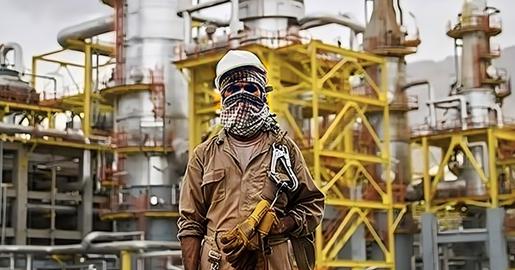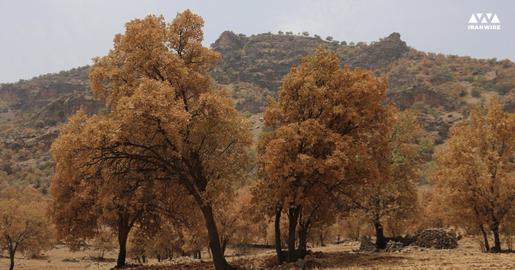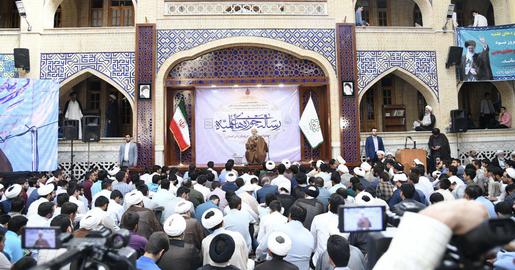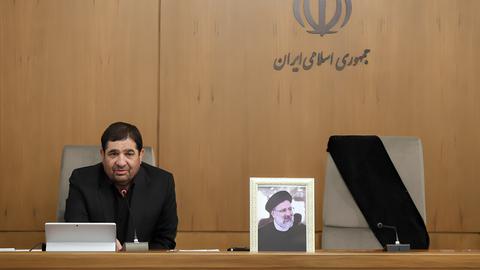A child crossing a river using two thin ropes – just to get to school. The heartrending image captured on video was published recently by Haalvsh, a news website covering Iran’s southeastern province of Sistan and Baluchistan, and it is one of many such stories that exposes the situation of Iran’s underprivileged children.
Over the past year, IranWire has published extensive reports on the difficult conditions facing children across Iran, children who have been forced to drop out of school, or who must avoid or escape various dangers on their way to school, and children who must study inside tents, under sheds or in classrooms that do not follow a minimum of acceptable standards.
We have reported on the fate of children who have given up their educations because of the difficulty of getting to school or the broader economic or social predicaments of their families, on child laborers and children who live in State Welfare Organization care centers and are subjected to a wide range of abuses, from torture to sexual harassment and even rape.
IranWire has also reported on families whose children suffer from ailments such as autism – on which much of Iranian society remains ignorant and uninformed. We reported on children with imprisoned parents and on teenage protesters who have been subjected to violence, from harsh interrogations and arrests to threats, insults and imprisonment.
IranWire’s new annual report on children’s rights in Iran is a summary of these reports over the past year. We wish we could bring you news of happy, healthy and thriving children, about schools that conform to the highest standards in the world, about children who have access to all the services they need, and about the prosperous society where these mythical children live.
But sadly, this is not the case, and our reports were bitter and painful. One day perhaps IranWire will be able to write about Iranian children who are as well-off as children in developed countries – and about a healthy society with happy children.
Over the past year, IranWire has published more than 200 reports about children’s rights in Iran, based on facts as reported by citizen journalists and children’s rights activists. and on interviews with victims, eyewitnesses and experts. Together these reports show that the Islamic Republic has violated many articles of the United Nations Convention on the Rights of the Child.
More than 60 percent of these reports illustrate the failure of the Islamic Republic to protect children from harm – covering the situations of more than 14,500 children. Thirteen percent of these reports, covering about four million children, relate to unjust or unequal access to education.
Six percent cover children who have been chastized for participating in protest gatherings in schools and for protesting compulsory hijab. Other cases, such as murder, poisoning in school and other forms of intimidation, have also had negative impacts on the lives of Iranian children.
Seven other reports relate to children’s freedom of speech, three are about sexual exploitation of children, and two other reports document violations of civil rights affecting the lives of more than 90,000 children.
The most shocking stories in IranWire’s reports relate to the killing or wounding of children during the 2022-2023 nationwide “Woman, Life, Freedom” protests, as well as a spate of chemical attacks on schools for girls, and efforts by security forces and Basij-associated teachers to intimidate schoolchildren, in part by forcing them to watch pornographic videos.
And from among the illegal acts committed by government agents in schools during the protests and after, we can point to the following instances: searching students’ bags; expulsions for chanting protest slogans at school; kidnapping children of politically active families or taking them as hostages, especially in Kurdish regions of Iran; raids on schools by uniformed or plainclothes agents and threatening children; taking large groups of schoolchildren to illegal detention centers, imprisoning adolescent schoolchildren next to serious criminals older than them; and conducting illegal interrogations, and without considering the psychological damage on minors.
The unprecedented use of child soldiers during “Woman, Life, Freedom” movement in 2022-23 – which led to serious injuries affecting thousands of Iranians – is another and an egregious violation of the provisions of Convention on the Rights of the Child to which Iran is a signatory.
A New School Year: Under the Boot of Security Forces
The 2023 school term began after a year during which more than 70 children were killed (alternatively, see this Persian article) by security forces during the nationwide “Woman, Life, Freedom” protests, and after more than 5,000 schoolchildren came under chemical attacks at their schools.
The perpetrators of the chemical attacks, in particular, remain unidentified and IranWire’s reporting shows that Iranian authorities have failed to respond to these attacks in a suitably robust form as required by the Convention on the Rights of the Child.
The chemical attacks on girls’ schools was a systematic and ongoing series of attacks – during which the students in a large number of schools across the country were poisoned.
The attacks began in the holy city of Qom after students across the country, especially students at girls’ schools, supported the protests during the Woman, Life, Freedom movement in the face of the government’s draconian measures to suppress the protests.
The attacks soon spread beyond Qom, to cities and provinces including Tehran, Borujerd, Sari, Ardebil, Fardis, Khuzestan, Kermanshah, Neyshabur and Mashhad. The majority of the victims were schoolgirls.
Showing Pornography at Girls’ Schools
On February 28, 2023, IranWire received information that Iranian female secondary students in Tehran and Bandar Mahshahr had been forced by security forces to watch pornographic videos, including scenes of rape and sexual intercourse between humans and animals, in an apparent effort to terrorize them and to dissuade them from supporting the protests.
According to a number of a students and parents who spoke with IranWire, students at these schools had been active in supporting the protests, and the security forces were trying to intimidate them.
According to IranWire’s information, members of the Islamic Revolutionary Guards Corps (IRGC) and paramilitary Basij force, armed with warrants from the Ministry of Education, went to girls’ schools in Tehran's 4th and 5th districts and to a girl’s high school called Shahid Reihane-ul-Nabi school in Bandar Mahshahr in Khuzestan province and, using threats, forced the schoolgirls to watch pornography that contained scenes of bestiality.
The justification that they offered to the students for their actions was that the protesters’ demands would lead to sexual decadence in Iran.
The students were shocked, as were the families after their children told them about it. At least one student suffered a nervous breakdown and had to be hospitalized for two days.
Some families lodged complaints with the judiciary, but their complaints were ignored. In Tehran, families lodged a complaint with a school principal and the General Department of Education of Tehran and threatened to withdraw their daughters from the school.
The Department of Education threatened to denounce both the students and their families to the security forces.
Despite strong reactions from the students and their families, reports of this kind continued to come to IranWire from other schools and cities.
A New School Year: Staffed by Basijis and Seminarians
According to information received by IranWire in September 2023, when the new school year started, dramatic changes had hit several girls' schools, where principals, assistants and even school guards were replaced by members of religious seminaries and the paramilitary Basij force.
An informed source in Tehran reported that Shahidan Javad-Nia and Hajar girls’ schools in Tehran’s 5th district, and Shohadaye Resaneh in the 6th district, were among several schools where the entire staff was replaced.
According to the parents of one student, when they went to school during the summer to register their daughter, the old staff was still present but on the first day of school they were gone and replaced by women affiliated with religious seminaries and the paramilitary Basij.
"Last year, my daughter's teacher, a staunch Basiji, frightened many students, constantly threatening them, saying that they would go to hell for dishonesty or wrongdoing," said Maryam, the mother of one of the students.
"The concept of hell deeply disturbed my nine-year-old daughter, and the fear of her own death, as well as that of her family, lingered due to these threats," she added.
"I had to arrange 20 sessions of psychotherapy with a psychologist to help her regain her emotional balance. Eventually, I transferred her to a different school to escape the extremism of her previous teachers," Maryam said.
Taking Revenge on Baluchi Children
Iranian schools were no longer safe for students after the protest movement. The government extended the suppression of protests into schools – where children were the targets. Many students were arrested, threatened, and expelled from school.
Depriving specific groups Iranian children of education and refusing to issue birth certificates and ID documents for them became increasingly prevalent after the protests.
In previous years, the Iranian government prided itself on facilitating the process of issuing identity documents, but IranWire’s reports have shown that not only was this claim false but the regime’s refusal to issue IDs to children has become worse; in particular, the government has denied children in Sistan and Baluchistan province ID documents and birth certificates, as a way to punish other Iranians from this region for their participation in the protests.
Confirming this report, Shir Ahmad Shirani, the Baluchi human rights activist, said: “Many [Baluchi] citizens have completed the preliminary stages of receiving identity documents but, after Zahedan’s Bloody Friday incident, the process has ground to a halt.”
“Bloody Friday” refers to September 30, 2022, when Islamic Republic security forces killed at least 108 protesters, bystanders and worshippers, including children, in Zahedan, the capital of the southeastern Sistan and Baluchistan province.
Increase in Self-Harm and Suicide Among Teenagers
The jump in the suicides, self-harm and depression rates among Iranian teenagers is another new crisis in the country. Teachers who spoke with IranWire believe many teenage students have suicidal thoughts because they have given up any hope that the situation in Iran will improve. And a psychologist told IranWire that the reasons for this troubling trend include hopelessness, poverty, and family problems such as divorce.
"I have counseled numerous teenagers … Based on my field investigations and the information gathered from these young patients, a significant portion of their classmates, peers and friends in Iran engage in self-harm and self-injurious behaviors," the psychologist said.
Abuse of Children Without Guardians or With Bad Guardians
According to the latest official figures, there are now around 10,000 children without guardians in the childcare centers of the State Welfare Organization. According to the Justice Ministry’s National Office of the Convention on the Rights of the Child, there are 640 childcare centers across Iran for children without guardians or with dangerous guardians, managed by the ministry.
In December 2023, IranWire learned of a childcare center for boys in the Tehran’s borough of Niavaran, called Bashir Hedayatollahi Center, where children are told that “You are Imam Khamenei’s children” but, at the same time, they abuse and torture them harshly and train them to join the regime’s security forces as child soldiers.
Some of these children have no guardians, some are born to imprisoned mothers or other prisoners, or executed individuals, and others have been abandoned by single mothers due to poverty.
The Right to Education Under the Shadow of Poverty
Another violation of children’s rights in Iran is the dearth of support for education that, in many cases, has resulted in children dropping out of school.
The Statistical Center of Iran recently reported that, in the past school year, close to 930,000 high school students dropped out. The majority of these students were between 15 to 17 years old. This is a two percent increase over the previous school year.
One of the most important factors in this increase is poverty. According to Iran’s Parliament Research Center, the number of Iranians living in poverty increased by around 11 million in the 10 years from 2011 to 2021. According to this report, the poverty rate was 35.6 percent in rural areas and 28.8 percent in urban areas.
The critical situation of child laborers, the increase in the rate of suicide among children and adolescents, honor killings, failure to provide for the cultural, ethnic and religious diversity of Iran in schools and the refusal to issue birth certificates for children, were among the topics IranWire covered over the past year. We also reported on the hardships of single mothers, lack of facilities for children with disabilities and special needs, and inhumane death sentences handed out to children.
The Islamic Republic of Failing to Protect Children
In October 2023, a spokesperson for Iran’s Justice Ministry addressed the government’s efforts to implement policies that meet the obligations of the UN Convention of the Rights of the Child – and to adapt these measures to Iranian realities.
The Iranian government is responsible for preventing gender-based child abuse, the spokesperson said; a statement delivered without irony, after a year during which chemical attacks on schoolgirls exposed the fact that gender-based harassment of schoolgirls was increasing in a systematic way.
The spokesperson also said that the government must respect the rights of children. But in the year prior to these remarks, the government killed, kidnapped, and arrested children, sometimes using those it had detained as child soldiers.
And finally, according to the spokesperson, the government had a binding obligation to prevent systematic discrimination; in the past year, however, if not earlier too, the situation of children in marginalized parts of Iran has deteriorated and the children in Sistan and Baluchistan province suffer from institutionalized discrimination in access to education and health.




























comments